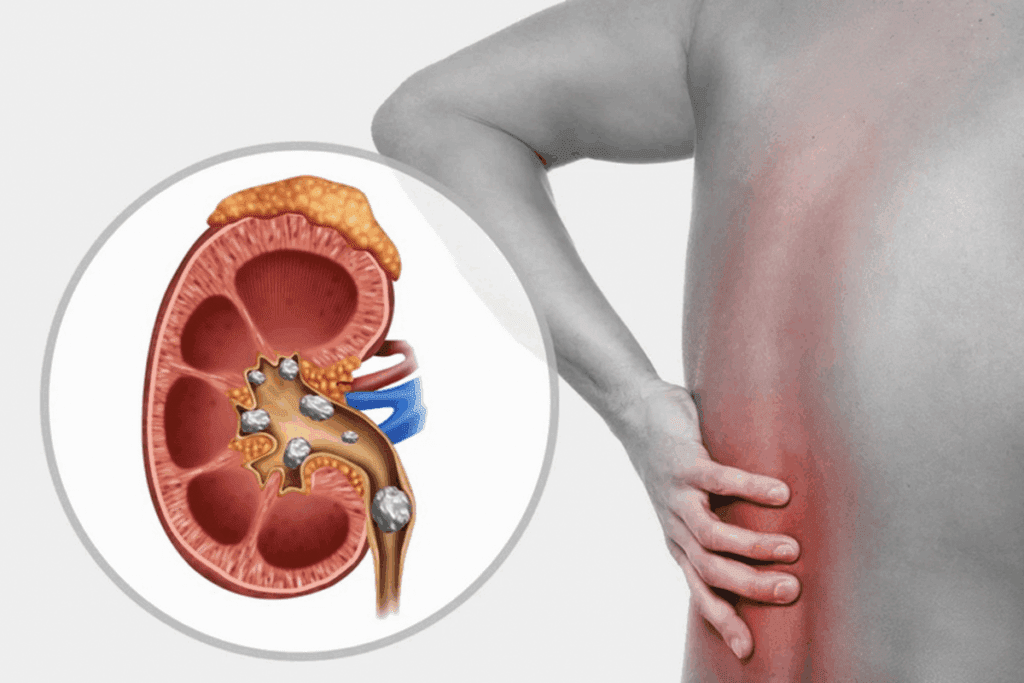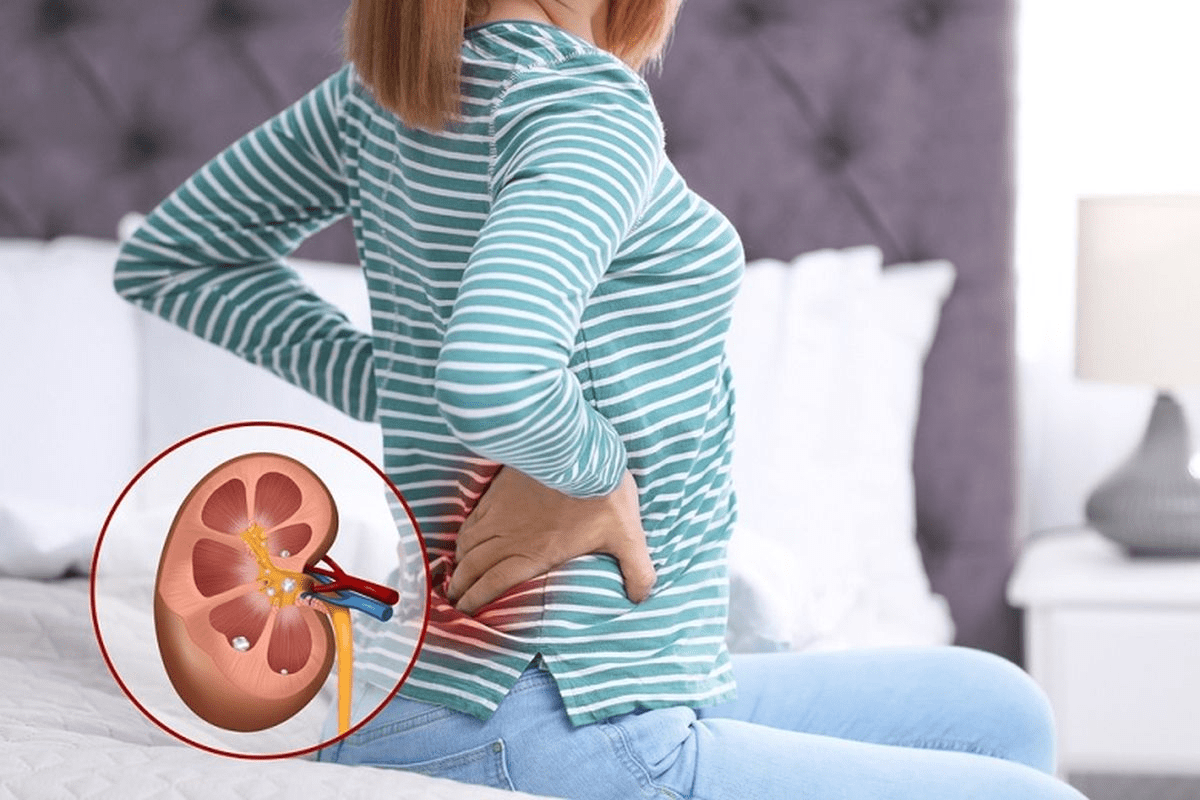Feeling severe pain in your flank? It might be due to a ureteral stone. These are small, hard mineral deposits in the kidneys or ureters. When they move, they can cause a lot of pain, spreading to the lower abdomen and groin.
What are the ureter stone symptoms? Learn the classic signs, including flank pain, that indicate a stone is lodged in the ureter.
It’s important to know the symptoms of ureteral stones. If you have persistent or severe pain, you should get medical help right away.
Causes and Risk Factors

Ureteral stones form due to genetic, environmental, and lifestyle factors. Knowing these causes and risk factors is key to prevention and management.
Several factors contribute to ureteral stones. These include:
- Dietary habits: Eating a lot of salt, animal protein, and foods high in oxalate can raise the risk.
- Hydration levels: Not drinking enough water can make urine more concentrated, raising the risk of stones.
- Genetic predisposition: People with a family history of kidney stones are more likely to get ureteral stones.
- Underlying medical conditions: Certain conditions, like hyperparathyroidism, gout, and urinary tract infections, can increase the risk.
A leading urologist says, “The risk factors for ureteral stones are complex. A complete approach is needed, including diet changes, enough water, and managing health conditions.”
We suggest that people at risk take steps to prevent ureteral stones. This includes:
- Eating a balanced diet low in salt and animal protein.
- Drinking enough water to prevent mineral concentration in urine.
- Managing health conditions with proper medical care.
By understanding and tackling the causes and risk factors of ureteral stones, we can prevent them and reduce the need for invasive treatments.
Symptoms and Diagnosis

Ureteral stones show clear symptoms, and finding them involves a few steps. We’ll look at the common signs and how doctors diagnose them.
The signs of ureteral stones include sharp pain in the flank or lower belly, nausea, vomiting, and sometimes fever. Severe pain, known as renal colic, is a key symptom and can spread to the groin. These symptoms happen because the stone blocks the ureter, causing urine to back up and leading to inflammation and pain.
Diagnosing ureteral stones takes a few steps. First, a healthcare provider will do a physical check-up and ask about your medical history. Imaging tests are key to confirming the diagnosis. The main imaging methods are:
- Non-contrast CT scans, which are very good at finding ureteral stones.
- Ultrasound, which can spot stones and signs of blockage.
- X-rays, which can sometimes show stones, but are not as good as CT scans.
After making a diagnosis, we can talk about the best treatment. The treatment choice depends on the stone’s size and location, and the patient’s health.
Early diagnosis is key for good management and avoiding problems. By knowing the symptoms and using the right tests, we can give timely and right care for patients with ureteral stones.

Treatment Options
Treating ureteral stones depends on the stone’s size, location, and symptoms. Small stones might just need pain relief and hydration. But bigger stones or severe symptoms might need more serious treatments.
Conservative Management
For small stones, doctors often start with conservative management. This means drinking lots of water to help pass the stone. They also use pain meds to ease discomfort.
Surgical and Interventional Options
For bigger stones or severe symptoms, more aggressive treatments are needed. These include:
- Extracorporeal Shock Wave Lithotripsy (ESWL): A non-invasive method that breaks the stone with shock waves.
- Ureteroscopy: A procedure where a small scope is used to see the stone directly.
- Percutaneous Nephrolithotomy (PCNL): A surgery to remove large stones.
Choosing the right treatment depends on many factors. These include the stone’s size, location, and the patient’s health. A doctor will help decide the best treatment plan.
Prevention
To prevent ureteral stones, you need to make lifestyle changes and manage health conditions. These steps can greatly lower your risk of getting stones.
Staying Hydrated
Drinking lots of water is key to avoiding ureteral stones. Aim for eight glasses a day. This helps remove minerals that can lead to stones.
Maintaining a Healthy Diet
Eating a balanced diet is important. Try to eat less sodium and animal protein. Avoid foods high in oxalate, like spinach and beets.
Managing Underlying Medical Conditions
Some health issues, like hyperparathyroidism and UTIs, raise your stone risk. Work with your doctor to manage these conditions. This can help prevent stones from forming.
FAQ
What are the common symptoms of a ureteral stone?
Symptoms include sharp pain in the side and back, below the ribs. The pain can radiate to the lower abdomen and groin. You might also feel pain or burning while urinating. Nausea and vomiting can occur as well.
How is a ureteral stone diagnosed?
Doctors use imaging tests like CT scans, ultrasounds, or X-rays to locate the stone and check its size. Urine tests are also done to look for infection or blood.
What are the treatment options for a ureteral stone?
Treatment depends on the stone’s size, location, and your symptoms. Options include pain relief, staying hydrated, medical therapy, or surgery. Surgical options may include ureteroscopy or shock wave lithotripsy.
Can ureteral stones be prevented?
Yes, ureteral stones can be prevented. Staying hydrated, eating a balanced diet, managing health conditions, and avoiding certain foods can help lower your risk.
What is ureteral calculus?
Ureteral calculus is a stone that forms in the ureter, the tube connecting the kidney to the bladder. It can cause severe pain and other urinary issues.
How does a stone in the ureter affect the body?
A stone can block urine flow, causing severe pain and increasing the risk of infection. It may also damage the kidney if left untreated. The symptoms depend on the stone’s size and location.
What are the risks associated with ureteral stones?
Risks include infection, kidney damage, and the formation of additional stones. A blocked ureteral stone can lead to serious complications such as kidney failure, making timely treatment essential.
References
National Center for Biotechnology Information – What Are the Symptoms of Ureteral Stones Feeling. Retrieved from https://www.ncbi.nlm.nih.gov/books/NBK560674/

































